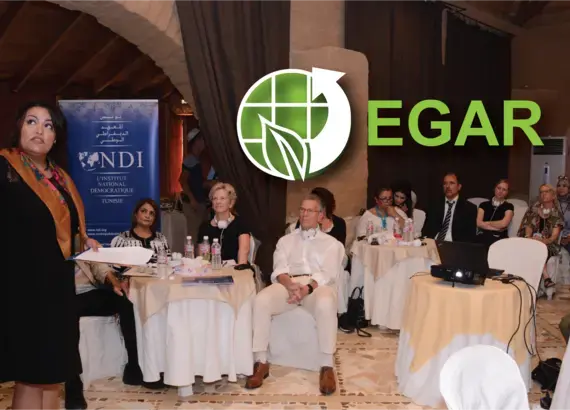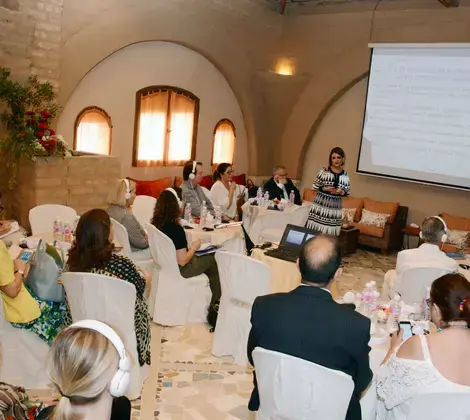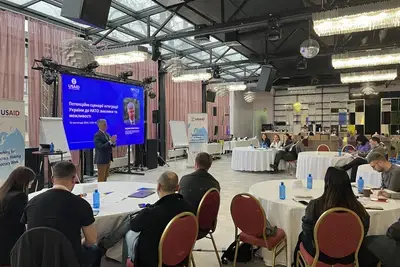
Success Story
Environmental Governance: The Critical Role of Legislatures
As the representative body of the people, legislatures play a critical role in enacting policies that advance sustainable outcomes. As the world continues to face the impacts of climate change, legislatures must develop resilient institutions and policies to both prepare for and manage possible threats. They must also maintain oversight of executive actions, especially in the implementation of policies and programs that are intended to provide critical safety nets to citizens in the event of natural disasters. Legislative action and oversight of environmental governance and resilience efforts are most successful if approached through cross-party initiatives, in addition to those that encourage trust building between government and civil society. In recent years, the National Democratic Institute (NDI), has worked with legislatures across the world to advance the capacity of legislative actors and institutions to advance environmental policies and in turn, sustainable practices. Each program underscores the importance of approaching environmental sustainability through a multi partisan lens, given no nation is immune to the threats of climate change and environmental degradation. Further, by advancing the representative, lawmaking, and oversight capacities of legislatures, governments build better defenses to withstanding environmental impacts, and policies to address environmental degradation are more effectively informed by citizen priorities for reform.
Tunisia: Drafting Effective Environmental Legislation Through Cross-Party Collaboration

nstituent requests for increased green space, cleaner air and stronger conservation measures. To help the Network achieve its goals, NDI provided technical advice on crafting effective legislation; connected parliamentarians to environmental experts; and convened civil society and government officials to exchange information on local environmental challenges and priorities.
Tunisia’s Sustainable Development Network achieved several notable successes, including the establishment of the Constitutional Body for Sustainable Development and the Rights of Future Generations. This body must be consulted about draft legislation relating to economic, social and environmental issues, as well as development plans. NDI organized a working session among MPs, technical experts and civil society representatives, after which members of the Sustainable Development Network succeeded in passing 31 out of 37 proposals.
Additionally, the Network’s advocacy efforts led to the passage of a financial decentralization law that appropriated funding to local communities for environmental sustainability and conservation projects. The Network worked with local civil society organizations to identify environmental community priorities that should be funded under this law. Finally, the Network encouraged the passage of a law prohibiting the use of plastic bags, which went into effect in Tunisia in January, 2021.
Kosovo: Green Caucus on Climate Change Responds to Citizen Environmental Priorities

on over environmental issues, the Caucus also seeks to hold local and national officials accountable. Moreover, Green Caucus members together raise awareness about climate change through statements, forums and by visiting local schools to encourage environmental education.
In October 2020, with support from NDI, Kosovo’s Green Caucus held hearings with civil society organizations about environmental degradation in Kosovo focused on air pollution, waste mismanagement, illegal exploitation of forests and the use of coal. The hearings underscored the overall lack of local and national coordination on issues concerning the environment, and the disproportionate role of the energy sector contributing to pollution. Several organizations advocated for environmental initiatives to address air pollution and the degradation of streams. The hearings concluded with a consensus that the Assembly should pass more environmental protection legislation. The Speaker of Parliament at the time and the current President, Dr. Vjosa Osmani, also agreed that the environment was among the top three priorities of parliament, and vowed to take action.
(The National Democratic Institute’s work in Kosovo is funded by the United States Agency for International Development (USAID))
Georgia: Innovating Legislative Procedures to Address Lead Contamination
In Georgia, citizens have grown increasingly concerned about lead poisoning. In 2019, UNICEF published the results of a nationally representative survey, demonstrating that approximately 41 percent of Georgian children had unsafe levels of lead in their blood. The release of this report ignited a public debate around lead contamination across the country. Not only did air pollution from car exhaust contribute to lead poisoning, but high lead content could also be found in food products, in paint in houses, and on toys.
In response, in 2020, NDI, with support from the United Kingdom’s Good Governance Fund, assisted the Parliament of Georgia use a new oversight mechanism to conduct an in-depth study, called a “thematic inquiry,” into lead contamination. As part of the process, NDI helped a parliamentary working group, led by the Chair of the Natural Resources and Environmental Protection Committee, develop key research questions; review relevant policy documents, regulations and studies; and identify independent experts to testify. In addition, NDI supported the working group in organizing public hearings with representatives of the executive branch at the national and local level to ensure a detailed understanding of the scale of the challenge and policy responses to date. Further, the working group met (in-person and virtually) with citizens most impacted by lead contamination, ensuring their voices were heard in the oversight process. Finally, while the thematic inquiry started as an in-person process, NDI assisted the working group in rapidly transitioning its work online due to the onset of the COVID-19 pandemic, making this first thematic inquiry to be conducted virtually.
Based on the findings of this inquiry, the working group produced a report with 20 recommendations for government action, including developing a plan for testing additional products for lead contamination; preparing a needs assessment of public sector capacity to regularly monitor lead contamination; and creating guidelines for construction and renovation of old buildings, particularly kindergartens. In addition to a roadmap for addressing this issue, the thematic inquiry strengthened the relationship between the parliament and citizens by engaging them in the oversight process and responding to citizen priorities; and demonstrated the importance of engaging experts, from civil society and academia, to ensure oversight processes are evidence-based. Looking ahead, the legislature will continue to conduct oversight of executive action on the issue through periodic inquiries of the government and requests for progress updates.
(The National Democratic Institute’s work in Georgia is funded by the Foreign, Commonwealth & Development Office.)
In each of these cases, NDI worked with parliaments to use new rules of procedure and the formation of thematic caucuses to strengthen legislation, investigative and oversight responsibilities, and to improve environmental governance. Strengthening legislative roles and responsibilities further consolidates democratic outcomes; and demonstrates the critical place legislatures have in enacting responsive, transparent, consensus-based and citizen-informed environmental policy.



